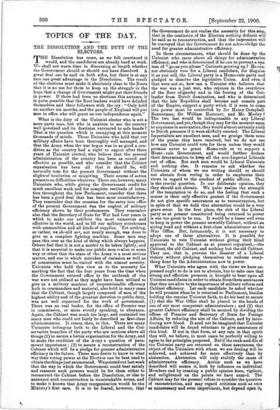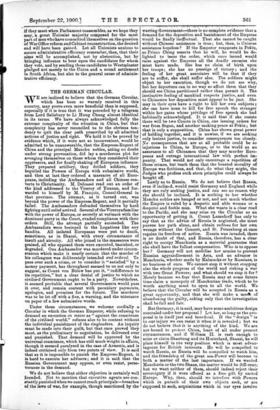TOPICS OF THE DAY.
THE DISSOLUTION AND THE DUTY OF THE ELECTORS. THE Dissolution has come, as we felt convinced it would, and the candidates are already hard at work. We shall not waste time in discussing at length whether the Government should or should not have dissolved. A great deal can be said on both sides, but there is at any rate one great advantage in the Dissolution. The result of the elections must make it absolutely clear to the Boers that it is no use for them to keep up the struggle in the hope that a change of Government might put their friends in power. If there had been no elections this autumn, it is quite possible that the Boer leaders would have deluded themselves and their followers with the cry : "Only hold on another six months, and the people of England will put men in office who will grant us our independence again."
What is the duty of the Unionist elector who is not a mere party man, but who is anxious to see the country well governed and its destinies entrusted to safe hands ? That is the question which is occupying at this moment thousands of minds. Those Unionists who hold that our military affairs have been thoroughly well managed, and that the Army when the war began was in as good a con- dition as the country had a right to expect after three years of Unionist control, who believe that the general administration of the country has been as sound and effective as possible, and who consider that the Cabinet organisation has been all that it should be, will naturally vote for the present Government without the slightest' hesitation or misgiving. Their course of action presents no difficulties whatever. There are, however, many Unionists who, while giving the Government credit for much excellent work and for complete rectitude of inten- tion throughout the late Parliament, consider that there has been a good deal that has been most unsatisfactory. They remember that the occasion for the entry into office of the present Government was the neglect of military efficiency shown by their predecessors. They remember also that the Secretary of State for War had four years in which to make our artillery the most numerous and effective in the world, and to fill our military storehouses with ammunition and all kinds of supplies. Yet nothing, or rather, we should say, not nearly enough, was done to give us a complete fighting machine. Some men may pass this over as the kind of thing which always happens. Others feel that it is not a. matter to be taken lightly, and that it is essential to make our public men realise in some way or other that the state of the Army is a most serious matter, and one in which mistakes of omission as well as of commission must be visited with the utmost severity. Unionists who hold this view as to the necessity for marking the fact that the four years from the time when the Government entered office to the outbreak of the war were not utilised as they might have been utilised to give us a military machine of unquestionable efficiency both in commanders and material, also hold in many cases that the Cabinet, though largely composed of men of the highest ability and of the greatest devotion to public duty, was not well organised for the work of government. There was no real leader, for the office of Premier was in commission, or more strictly speaking, in abeyance. Again, the Cabinet was much too large, and contained too many men who could not fairly be described as first-class administrators. It comes, then, to this. There are many Unionists belonging both to the Liberal and the Con- servative branches of the party who are anxious above all things (1) to secure a better organisation for the Army, and to make the condition of the Army a question of para- mount importance ; (2) to secure a reconstruction of the Cabinet which will be a pledge for greater administrative efficiency in the future. These men desire to know in what way their voting power at the Election can be best used to obtain the thin gs just enumerated. We pointed out last week that the way in which the Government could best satisfy and reassure such persons would be for them either to reconstruct the Cabinet before the Dissolution, or else to announce such reconstruction in unmistakable terms, and to make it known that Army reorganisation would be the Ministry's first care. It is to be feared, however, that the Government do not realise the necessity for this step, that in the confusion of the Election nothing definite will be said as to reconstruction, and that the impression will be conveyed that the Government do not acknowledge the need for greater administrative efficiency.
In these circumstances, what should be done by the Unionist who cares above all things for administrative efficiency, and who is determined if he can to prevent a sys- tem of " go-as-you-please " Cabinets growing up ? He can- not obviously vote for a Liberal candidate, for disguise it as you will, the Liberal party is a Home-rule party and pledged to dissolve the legislative Union. And even if that were not so, how can a Unionist who believes that the war was a just war, who rejoices in the overthrow of the Boer oligarchy and in the freeing of the Out- lander from Dutch domination, and who is determined that the late Republics shall become and remain part of the Empire, support a party which if it were to come into power must he controlled by Sir Henry Campbell- Bannerman, Sir William Harcourt, and Mr. Morley ? The two last would be indispensable to any Liberal Government, and yet,though they may for the moment seem to acquiesce in annexation, they would almost certainly yield to Dutch pressure if it were skilfully exerted. The Liberal Imperialists are excellent men, and we grudge them none of the praise they have received, but we do not see how any Unionist could vote for them unless they would promise never to grant Home-rule or to support a Home - rule Government, and would further declare their determination to keep all the non-Imperial Liberals out of office. But such men would be Liberal Unionists and nothing else. It remains to ask whether the Unionists of whom we are writing should or should not abstain from voting in order to emphasise their views in regard to the conduct of public affairs. That is the crucial question. In our deliberate opinion, they they should not abstain. We quite realise the strength of the temptation to do so, and the feeling that such a course is their only effective protest if the Government do not give specific assurances as to reconstruction, but in spite of that we hold that abstention would be a very grave error. In the first place, the risk of the Liberal party as at present constituted being returned to power is one too great to be run. It would be a lesser evil even to keep in power the present unwieldy Cabinet, without an acting head and without a first-class administrator at the War Office. But, fortunately, it is not necessary to adopt one of these alternatives. It is possible for Unionists to vote Unionist without giving their blind approval to the Cabinet as at present organised,—the Cabinet, the old Cabinet, and nothing but the old Cabinet. They can, that is, prevent the disaster of a Liberal -victory without pledging themselves to endorse every- thing-done by the Administration now in power.
What Unionists who agree with the views we have ex- pressed ought to do is not to abstain, but to take care that strong and effective pressure is brought to bear upon all Unionist candidates in order to obtain from them aseurances that they are alive to the importance of military reform and Cabinet efficiency. Let each candidate be asked whether he will promise when he is returned to Parliament, besides holding the regular Unionist faith, to do his best to secure (1) that the War Office shall be placed in the hands of one of our most competent administrators ; and (2) that greater Cabinet efficiency shall be secured by dividing the offices of Premier and Secretary of State for Foreign Affairs, by reducing the size of the Cabinet, and by intro- ducing new blood. It need not be imagined that Unionist candidates will be found reluctant to give assurances of this kind. If not in that form, at any rate in that spirit they will, we believe, in most cases be perfectly willing to agree to the principles proposed. Butif the rank-and-file of tne Unionist party are returned on those assurances, the object of the Unionists with whom we are dealing will be achieved, and achieved far more effectively than by abstention. Abstention will only stultify the cause of administrative efficiency. Action such as we have described will secure it, both by influence on individual Members and by creating a public opinion keen, vigilant, and enlightened on the points we have named. The Cabinet may for the present refuse to consider the question of reconstruction, and may regard criticism such as ours as unnecessary and even impertinent, but depend upon it, • if they meet when Parliament reassembles, as we hope they may, a. great Unionist majority composed for the most part of men who have committed themselves on the question of War Office reform and Cabinet reconstruction, the desired end will have been gained. Let all Unionists anxious to secure administrative efficiency remember, then, that their aims will be accomplished, not by abstention, but by bringing influence to bear upon the candidates for whom they vote, and by sending those candidates to Westminster pledged not merely to the Union and a sound settlement in South Africa, but also to the general cause of adminis- trative efficiency.







































 Previous page
Previous page